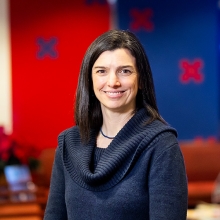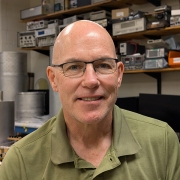Molly McGlone Promoted to Deputy Dean of Undergrad Studies

Molly McGlone has been promoted to Deputy Dean of Undergrad Studies, continuing her successful tenure within the College of Arts & Sciences. McGlone, who has been part of the Penn community since 2010, most recently served as Associate Dean and Director of Academic Affairs.
“In her 15 years of outstanding service, Molly has worked in and developed expertise in all areas of the College’s core work,” says Peter Struck, Stephen A. Levin Family Dean of the College of Arts & Sciences. “I will continue to rely on her sound judgement, boundless energy, and deep commitment to our core mission of advancing the education and intellectual independence of our extraordinary students.”
The Deputy Dean role will work closely with Struck to develop and advance the College’s mission, along with heading up the senior leadership team and overseeing all aspects of the work of the College office. McGlone says she is excited about the opportunity to take on a bigger role and bring into the position the experience and knowledge she has gained from her broader College tenure.
“I have truly learned a lot from students and colleagues over the years, not only about how to work together to address unforeseen challenges, but also how to creatively envision new ways of asking questions, organizing our work together, or figuring out how to learn across differences,” McGlone says. In the new role, she hopes to work with the College’s interdisciplinary programs and departments to “leverage the relationships, creativity, and dedication of our staff and faculty to help us strengthen and support undergraduate education.”
A scholar of music, McGlone earned her doctorate in Musicology from the University of Wisconsin, where she also served as Assistant Director of the Letters and Science Honors Program for three years. Her work with Penn’s College of Arts & Sciences began as Assistant Dean for Academic Advising and as a Faculty Fellow at Fisher Hassenfeld College House.
McGlone was named Associate Director and Assistant Dean for Academic Affairs in 2017, and was promoted to Associate Dean and Director of Academic Affairs in 2021. In those roles, she proved critical in supporting student success and shaping academic policy. She has also taught first-year seminars about music and urban space, as well as advocated for community engagement in the arts and supported service work for Penn students.
Image: Eric Sucar/University Communications





